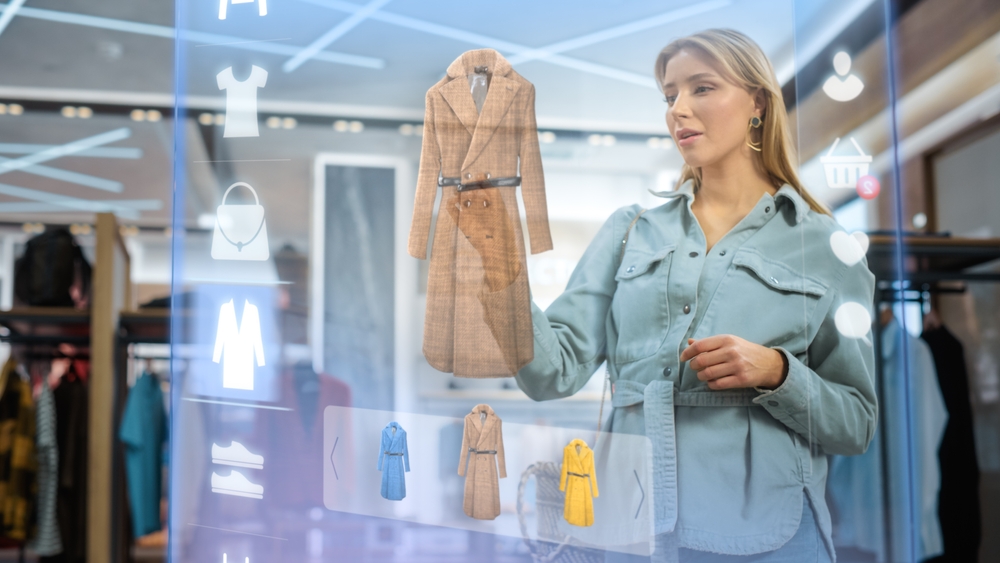Technology has permeated almost every part of our lives in the current digital era, and the fashion business is no different. The blending of fashion and technology has created an interesting and quickly developing industry known as “Fashion Tech.” This point of intersection has fundamentally changed how we feel and engage with clothing as well as how we develop, produce, and consume fashion. The future of the fashion business is being changed by fashion technology, which ranges from smart materials to augmented-reality shopping experiences.
Smart Fabrics and Wearable Technology:
- The creation of wearable technology and smart fabrics is one of the most notable ways that technology has impacted the fashion industry. Modern electronics, sensors, and connections are incorporated into these cutting-edge textiles to improve their functionality and appearance. Smart materials can be instructed to change colors and patterns, regulate temperature, or even monitor vital signs.

- Designers have developed, for instance, clothing with biometric sensors that can monitor stress levels, breathing patterns, and heart rate. Athletes, patients, and anyone who wants to keep track of their well-being can all benefit greatly from this information. In addition, businesses are testing materials that might produce energy through movement, possibly powering equipment or charging smartphones while in motion.
Augmented Reality and Virtual Fitting:
- Retail in the fashion industry has gained a new dimension because of virtual and augmented reality technologies. Customers can try on garments virtually, without the need to put them on. Customers can virtually try on various sizes, styles, and colors of clothing using their smartphones or other specialized equipment to see how the clothing will fit and appear on them. This technology improves the online shopping experience while also saving time and reducing the need for physical changing rooms.
- In addition, augmented reality enables clothing companies to design engaging purchasing environments. Customers can create a customized and interactive shopping experience by using their smartphones or other AR-capable devices to superimpose virtual apparel and accessories onto their bodies. Brands can reach a worldwide audience without being limited by physical places by showcasing their collections at virtual fashion shows or setting up virtual pop-up shops.
Data-Driven Personalization:
- Through data-driven technology, fashion tech has ushered in a new era of individualized fashion experiences. Fashion firms are able to learn more about the preferences, actions, and trends of their customers by utilizing data analytics and artificial intelligence. They can use this data to produce individualized suggestions, custom marketing initiatives, and carefully curated buying experiences.
- Online shops, for instance, can employ algorithms to analyze client data and offer tailored product recommendations based on preferences for particular looks, browsing history, and buying habits. This degree of customization drives sales, engagement, and client happiness.

Sustainable Innovations:
- In order to address the environmental issues the fashion business faces, fashion tech is essential. Designers and technologists are investigating ways to incorporate technology to decrease waste, save resources, and develop more sustainable practices with sustainability at the forefront.
- The growing use of 3D printing in fashion is one instance. Designers may utilize 3D printers to make detailed, individualized clothing that uses less fabric and costs less to produce. With the use of this technology, manufacturing may be done on demand, doing away with the requirement for extra inventory and large-scale production.
- Blockchain technology is also being investigated to improve traceability and transparency in the fashion supply chain. By utilizing the decentralized nature of blockchain, consumers can validate the legitimacy and moral origin of products, encouraging fair trade and minimizing the circulation of fake goods.
Technology and fashion have come together in a dynamic and disruptive way with fashion tech. The fashion industry is changing as a result of the convergence of smart materials, wearable technologies, augmented reality, and environmental initiatives. Fashion tech is pushing limits and opening up new opportunities, from improving apparel functionality to revolutionizing the shopping experience.
We may anticipate more discoveries and original solutions in this fascinating subject as technology develops. With the ability to make fashion more affordable, sustainable, and individualized than ever before, fashion technology has the power to completely transform the way we wear, shop, and express ourselves.

